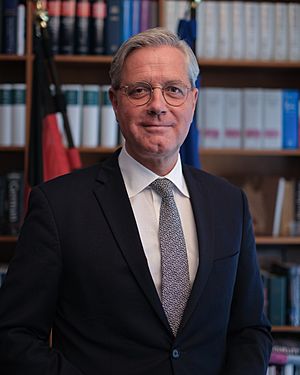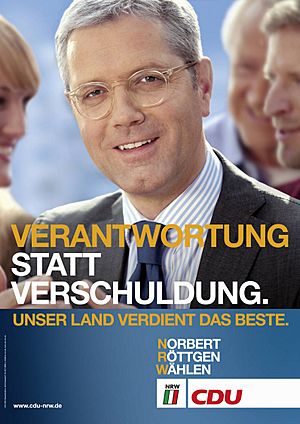Norbert Röttgen facts for kids
Quick facts for kids
Norbert Röttgen
|
|
|---|---|

Röttgen in 2021
|
|
| Member of the CDU Committee | |
| Assumed office 16 January 2021 Serving with Bernd Althusmann, Monika Grütters, Michael Kretschmer, Karl-Josef Laumann, Annette Widmann-Mauz and Reiner Haseloff
|
|
| Leader | Armin Laschet Friedrich Merz |
| Preceded by | Jens Spahn |
| Chair of the Committee on Foreign Affairs | |
| In office 15 January 2014 – 15 December 2021 |
|
| Deputy | Franz Thönnes Daniela De Ridder |
| Preceded by | Ruprecht Polenz (2013) |
| Succeeded by | Michael Roth |
| Minister for the Environment, Nature Conservation and Nuclear Safety | |
| In office 28 October 2009 – 16 May 2012 |
|
| Chancellor | Angela Merkel |
| Preceded by | Sigmar Gabriel |
| Succeeded by | Peter Altmaier |
| Deputy Leader of the Christian Democratic Union | |
| In office 15 November 2010 – 5 December 2012 |
|
| Leader | Angela Merkel |
| Preceded by | Roland Koch |
| Succeeded by | Armin Laschet |
| Leader of the Christian Democratic Union in North Rhine-Westphalia | |
| In office 6 November 2010 – 13 May 2012 |
|
| General Secretary | Oliver Wittke |
| Deputy | Ursula Heinen-Esser Armin Laschet Karl-Josef Laumann Michaela Noll Sven Volmering |
| Preceded by | Jürgen Rüttgers |
| Succeeded by | Armin Laschet |
| Chief Whip of the CDU/CSU Group in the Bundestag | |
| In office 25 January 2005 – 26 October 2009 |
|
| Leader | Angela Merkel Volker Kauder |
| Preceded by | Volker Kauder |
| Succeeded by | Peter Altmaier |
| Member of the Bundestag for Rhein-Sieg-Kreis II |
|
| Assumed office 10 November 1994 |
|
| Preceded by | Franz Möller |
| Personal details | |
| Born |
Norbert Alois Röttgen
2 July 1965 Meckenheim, West Germany (current-day Germany) |
| Political party | Christian Democratic Union |
| Spouse | Ebba Herfs-Röttgen |
| Children | 3 |
| Education | University of Bonn |
| Signature | |
Norbert Alois Röttgen (born 2 July 1965) is a German lawyer and politician. He was a very important person in the German government. From 2009 to 2012, he served as the Federal Minister for the Environment. This means he was in charge of protecting nature and the environment for the whole country. He worked in the government of Chancellor Angela Merkel.
Norbert Röttgen is a member of the Christian Democratic Union (CDU) political party. He has tried to become the leader of his party several times. From 2014 to 2021, he was the chairman of the Bundestag Foreign Affairs Committee. This committee deals with Germany's relationships with other countries.
Contents
Early Life and Education
Norbert Röttgen grew up in North Rhine-Westphalia, a state in Germany. He finished high school at the Gymnasium of Rheinbach. After that, he started studying law at the University of Bonn in 1984.
He passed his first law exam in 1989 and his second in 1993. After finishing his studies, he worked as a lawyer in Cologne. In 2001, he earned a special degree called a legal doctorate from the University of Bonn. His special project for this degree was about the Court of Justice of the European Union.
Political Career
Norbert Röttgen joined the CDU party in 1982. He was still a high school student at the time. From 1992 to 1996, he led the Young Union, which is the youth group of the CDU, in North Rhine-Westphalia.
Becoming a Member of Parliament
Röttgen was elected to the Bundestag in 1994. The Bundestag is like Germany's parliament, where laws are made. From 2002 to 2005, he was the main spokesperson for legal policies for his party's group in the Bundestag.
From 2005 to 2009, he was the Chief Parliamentary Secretary for the CDU/CSU group. This was during a time when the CDU/CSU and another party, the SPD, worked together in a "grand coalition." In this role, he helped manage the government's work in parliament. He also helped oversee Germany's intelligence services.
Environment Minister for Germany
After the 2009 federal election, Norbert Röttgen became the Federal Minister for Environment, Nature Conservation and Nuclear Safety. He held this important job from October 2009 to May 2012. In this role, he was responsible for Germany's environmental policies.
As Environment Minister, Röttgen led Germany's teams at big international meetings about climate change. These meetings included conferences in Copenhagen, Cancún, and Durban.
In May 2011, Röttgen announced a big plan for Germany. The government decided to close all of the country's nuclear power plants by 2022. This decision came after the Fukushima Daiichi nuclear disaster in Japan. Later that year, he helped start the Bonn Challenge. This project aimed to reforest 150 million hectares of land by 2020. That's an area four times bigger than Germany!
State Election and Leaving the Cabinet
In 2012, Norbert Röttgen decided to run for a top job in his home state, North Rhine-Westphalia. He wanted to become the Minister-President, which is like the governor of the state. He ran against the current leader, Hannelore Kraft.
Röttgen lost the election by a large amount. After this defeat, he resigned from his position as the head of the CDU in North Rhine-Westphalia. On May 16, 2012, Chancellor Merkel removed him from his job as Environment Minister. This was a very unusual step, as ministers usually resign themselves. Peter Altmaier took over his role as Environment Minister.
Leading the Foreign Affairs Committee
From 2014 to 2021, Norbert Röttgen was the chairman of the Bundestag's Committee on Foreign Affairs. This committee focuses on how Germany interacts with other countries.
During this time, he traveled with German President Joachim Gauck to India and Myanmar in 2014. He also visited Kyiv, Ukraine, with other European politicians to show support for Ukraine. In 2018, he represented Germany at the funeral of U.S. Senator John McCain.
In 2020 and 2021, Röttgen ran for the leadership of the CDU party. He finished second in the December 2021 election.
Deputy Chair of the CDU/CSU Group
Since 2025, Norbert Röttgen has been serving as a deputy chair of the CDU/CSU group in the Bundestag. In this role, he helps guide the group's work on foreign policy, defense, and human rights.
Political Views
Norbert Röttgen has strong opinions on many global issues.
European Cooperation
In 2011, Röttgen suggested ways to make the European Union stronger. He wanted people to directly elect the leader of the European Commission. He also thought the EU should have a two-part political system and hold elections across Europe at the same time.
After the United Kingdom voted to leave the European Union in 2016, Röttgen helped write a plan for a "continental partnership." This plan suggested a way for Britain to work closely with the EU while having some control over people moving between countries.
Relations with Russia
Röttgen believes Germany should be more firm in its foreign policy. In 2014, he said that Germany was at the center of the situation in Crimea. He also worried about Germany becoming too dependent on Russia for energy. He called for a review of the Nord Stream 2 gas pipeline, saying it could divide Europe.
He supported the European Union's decision to put sanctions on Russia after the vote in Crimea. He wanted Europe to respond to violence in Ukraine with more sanctions. However, he did not support sending weapons to Ukraine, saying it could make the conflict worse.
Relations with the Middle East
In 2014, Röttgen said that sending weapons to the Iraqi government would go against Germany's rules for exporting arms.
In 2016, he suggested that Germany might change its strong support for Israel. This was due to concerns about Prime Minister Benjamin Netanyahu's policies. In 2019, he warned that Germany could upset its European partners if it kept a ban on selling weapons to Saudi Arabia.
Relations with Iran
In 2014, Röttgen visited Tehran, Iran, as part of a group. He later joined other leaders in urging countries to reach a nuclear deal with Iran. He believed it was a very important chance to make a final agreement.
Relations with Turkey
In 2015, Röttgen urged German politicians to call the killing of many Armenians in 1915 a genocide. He also said that Germany should admit its own part in what happened.
Climate Change and the Environment
After a climate change meeting in 2009, Röttgen criticized leaders from the U.S. and China. He said China didn't want to lead, and the U.S. couldn't lead on climate issues. In 2010, he joined other European ministers in asking the European Union to cut greenhouse gas emissions even more.
Norbert Röttgen and Angela Merkel were key in Germany's plan to move away from nuclear power. In 2012, Röttgen's plan to cut money for solar power caused some debate. Critics said it could cost many jobs in the solar industry.
Relations with the African Continent
Röttgen has often voted for Germany to take part in United Nations peacekeeping missions in Africa. These missions help keep peace in countries like Somalia, Sudan, South Sudan, Mali, and the Central African Republic.
Relations with China
In 2020, Röttgen criticized European ambassadors for allowing a Chinese state newspaper to remove parts of an article they wrote. He said it was important for Europe to speak with one voice, but it must reflect European values.
In 2021, Röttgen and another politician, Anthony Gonzalez, led a letter from about 70 lawmakers. They asked leaders to be firm with China and avoid relying on China for technology like artificial intelligence and 5G.
Other Activities
Norbert Röttgen is involved in many other groups and organizations.
Boards and Foundations
- KfW: He was a member of the Board of Supervisory Directors from 2009 to 2012.
- Club of Three: He has been the President of the Steering Group since 2019.
- Atlantik-Brücke: He has been the Deputy chairman of the board since 2019.
- European Council on Foreign Relations (ECFR): He has been a Co-chair since 2019.
- Development and Peace Foundation (SEF): He has been a Member of the Board of Trustees since 2019.
- Hertie School of Governance: He has been a Member of the Board of Trustees since 2008.
- Asia House: He is a Member of the Advisory Board.
- Humanity in Action Germany: He is a Member of the Advisory Board.
- CARE Deutschland-Luxemburg: He is a Member of the Board of Trustees.
- Jacques Delors Institute Berlin: He is the chairman of the Advisory Board.
- Konrad Adenauer Foundation: He is a Member.
- Max Planck Institute for the Study of Societies: He is a Member of the Board of Trustees.
- Stiftung Neue Verantwortung: He is a Member of the Board of Trustees.
- Villa Vigoni Association: He is a Non-permanent Member of the Board of Trustees.
Personal Life
Norbert Röttgen is married to Ebba Herfs-Röttgen, who is also a lawyer. They have three children together. When he was a child, Norbert Röttgen played the accordion.
See also
 In Spanish: Norbert Röttgen para niños
In Spanish: Norbert Röttgen para niños
 | Delilah Pierce |
 | Gordon Parks |
 | Augusta Savage |
 | Charles Ethan Porter |


